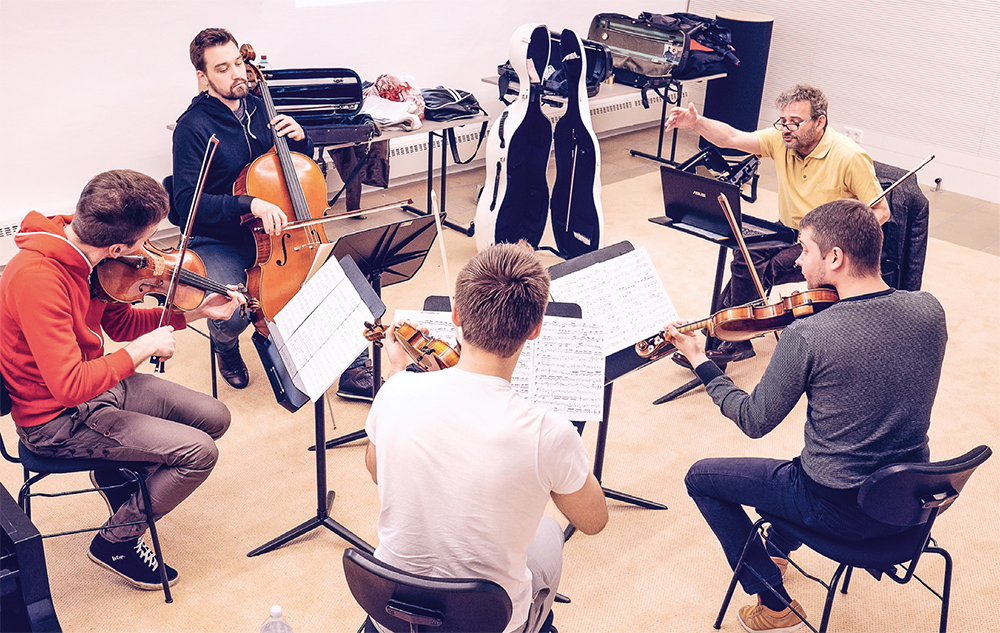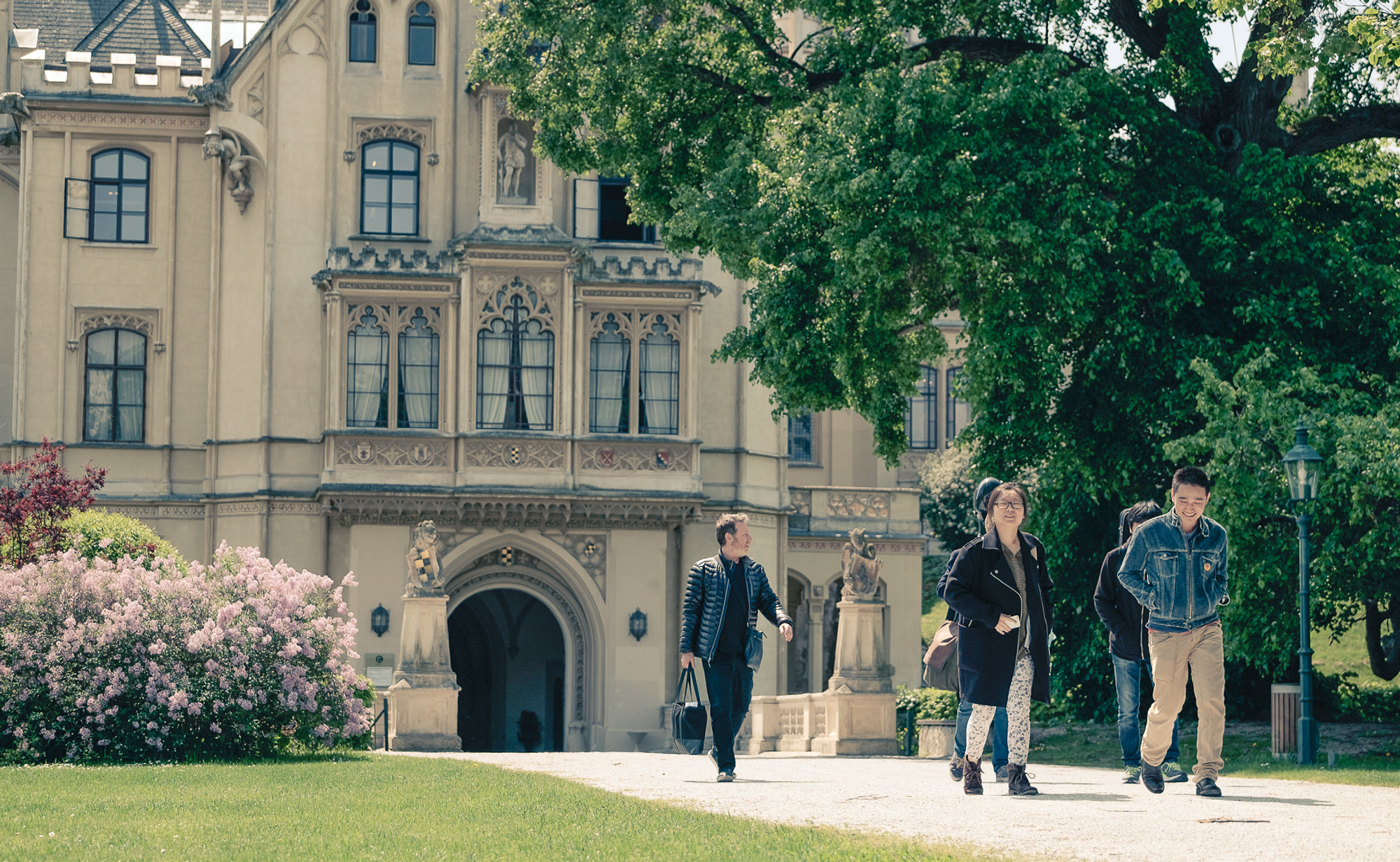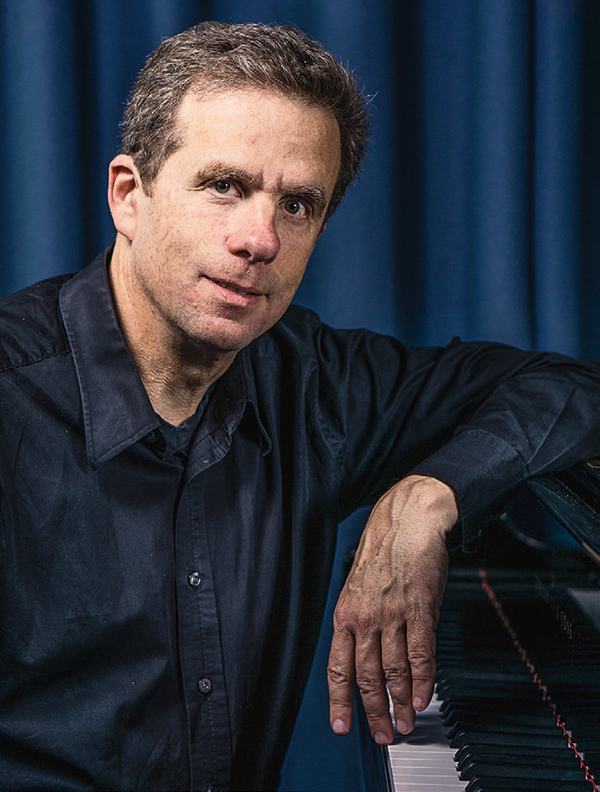As part of the upcoming session of ECMA – the European Chamber Music Academy at Schloss Grafenegg between 21 and 27 May 2018, selected string quartets and piano trios will develop their interpretations of chamber music works together with international lecturers and tutors. This session will off er that fi nal bit of polish for ensembles who already play at a superlative level as well as the opportunity to closely examine chamber music’s inner substance—a valuable mixture for the participating formations’ further careers. And this time around, internationally renowned pianist David Dolan will be teaching the art of classical music improvisation.

In the following interview, ECMA artistic director Johannes Meissl gives us a summary of the Academy’s current objectives and development.
Mr. Meissl, on the website www.ecma-music.com, you define ECMA as a “European talent factory for young professional chamber music ensembles”— which sounds like a lofty aspiration. How exactly do you go about achieving it?
Johannes Meissl (JM): We achieve it on the basis of our on-going efforts aimed at the highest, most professional student level—which means working with groups of ambitious student chamber musicians who want to become capable of performing professionally and having a career together. Back in 2003, the idea was born to work on chamber music in the form of events in different places, taking advantage of different kinds of working conditions, backgrounds, expertise, and people.
Since the very beginning, we’ve been holding two auditions annually where ensembles present themselves with programmes covering various stylistic eras and also go through extensive interviews with us. And the procedure by which they go on to actually become part of the ECMA family includes participation in at least two working sessions either before or after their auditions. If we deem them suitable and eligible, they’re initially given “Aspirant” status—and if they then turn out to have the right attitude along with the ability to process things and put them into practice relatively fast, they’re listed as official “ECMA Ensembles”. This entails that they participate regularly in such working sessions over a period of between two and three years. So membership is long term: it’s not a series of isolated master classes, but a sort of informal programme. This hasn’t yet been academically regulated, nor has it been integrated into the curricula of the participating organisations. But this will be changing in certain respects with the introduction of our joint masters’ degree programme, the so-called ECMAster.

In addition to classic ensemble coaching, each session includes lectures, workshops, group discussions, and inputs that are always theme-related and sometimes need not at all be directly related to what one’s doing at the moment—like topics from complexity research, for example. We seek first and foremost to make our participants conscious of just what the foundations of independent interpretation are. That’s a lot of information and knowledge, of course, but it’s most of all about developing the ability to truly read musical texts and then be able to appropriately contextualise and decipher them. So the point is to pass on an attitude towards interpretation and learning all the things you need to know to be able to arrive at such an interpretation in the first place. Over the past 15 years, this has been a fruitful approach insofar as a great many of the ensembles that spent time with us have gone on to enjoy quite a bit of success in the outside world. We’ve had lots of competition winners and, more importantly, a large number of ensembles who’ve been able to truly establish themselves in musical life.

ECMA’s currently carrying out a partnership programme together with Erasmus + called “ECMA Next Step”. In what direction is this next step being taken?
JM: This programme was launched back in 2015 and will continue until August 2018. The primary working goal we set was to develop a joint master’s degree programme, and it looks like that’s going to be a success: we now have a consortium agreement and a programme description that have been signed by all of the involved universities’ rectors.
We’ve already implemented the agreement at the mdw, and the relevant studies commission is currently working out the specific curriculum that will be followed here. The programme description establishes a framework that determines how ECTS points are distributed, and above all how the rotation of exchange semesters as well as the audition and admission procedures should function; additionally, it defines learning outcomes—in other words, what this degree programme is supposed to achieve. All these things as well as the legal aspects are spelled out in more detail in the Consortium Agreement. Each of the seven participating schools is now developing its own adapted curriculum that will apply here, since every ensemble that we accept will be registered at a home institution—where they’ll remain registered, spend their final semester, and graduate. By graduation, every ensemble will also have attended two other schools as a guest ensemble. And on top of this, a minimum of six regular one-week ECMA sessions within these two years will be obligatory, although we recommend that the ensembles visit as many sessions in as many countries as possible.
Our approach is to take the expertise that’s necessary for getting to a top-notch level—expertise that isn’t necessarily concentrated at any one location in Europe, of course—and apply it well enough as a group that students can profit from it to the maximum possible extent. That’s one direct outcome we get from this partnership.
And there are two other working goals we’ve defined. The one is to document existing learning and teaching methods in chamber music— and ideally formulate new ones—according to the principle of student-centred learning. The other is to develop an active connection with what EU-speak calls “professional partners”, meaning promoters and festivals. And in this area, we’ve taken some very good, sustainable steps forward over the past two years in the form of cooperation agreements with festivals and concert organisers.
This year, ECMA is taking place at Schloss Grafenegg in Lower Austria. What’s special about this location?
JM: This year will be our fourth session in cooperation with Grafenegg. Our relationship with them was born out of our mutual interest. When Grafenegg approached us and asked whether it would be feasible to set up an ECMA location or centre with them, we told them we’d see how it went if we tried holding the sessions that had previously always been held on the mdw campus at their palace. For us, of course, it’s been great to have wonderful infrastructure free of any space-related difficulties. And the biggest motivation on our end was naturally the prospect of having a cooperative relationship with an event organiser like the internationally renowned Grafenegg Festival—which, thanks to its reputation, would provide quite a bit of added value for ECMA in terms of collaborating with professional partners. Both sides are convinced that we, as heralds of chamber music, need to establish a potential chamber music audience beyond the longstanding target groups. And that’s why our cooperation presented itself as a win-win situation right from the beginning—and why we’ll be continuing it.
One of ECMA’s international tutors in 2018 is David Dolan. What does he bring to the table, and what does that mean for the focus of this year’s academy?

JM: David Dolan is the leading light of the English improvisation scene in terms of chamber music and classical music in general. This isn’t about specialised, style-based improvisation here, but about improvisation as a fundamental stance, as a key to understanding, and ultimately as a tool we can use to improve our interpretational abilities. These improvisatory approaches from various perspectives have been a big topic for ECMA for years and have long since already been anchored in the curricula of the mdw. I know that other institutions are likewise putting a very strong emphasis on it, and I also know why they’re doing so. This is a very important point, so I’m very happy that we have David Dolan in our team.
The goal is to unearth the foundations or patterns on which highly complex, elaborate, and detail-rich compositions are often based. And the next step after that is having the courage to invent something of one’s own on the basis of these harmonic or other patterns, doing one’s own improvisation and arriving at something thoroughly listenable while also gaining an entirely different understanding of what’s really in the musical text. That’s a direct necessity in music written before 1800, of course, because in such repertoire, only some of what has to happen was actually put to paper. But there are extremely helpful approaches here for the music of the 19th and 20th centuries, as well, approaches that help us to not simply fall into execution mode but instead achieve what’s become something of an omnipresent postulate: namely, that the music always sound as if it had just been created.
What’s more, learning the basics of improvisation just generally helps develop your ability to be alert to what others are doing while you’re also doing something on your own—which is a pretty simple but substantial definition of chamber music as such. It’s not either/or, doing and listening—it has to happen simultaneously. And that’s quite a challenge!
What unites all of us here at ECMA is our radical willingness to dig down deep and not shy away from asking unsettling questions. And we’re about aiming for substance instead of the superficial, because attaining the deepest possible understanding of the substance immensely broadens your range. Which brings me to another thing that’s very important to us: one of my greatest joys in working with ECMA is that we have a large number of very special ensembles where no single one of them plays like any of the others. And even so, you can still make out a certain “ECMA handwriting” in that people can always hear how it’s quite obviously about something substantial. In terms of just how this something substantial is manifested in each individual case, however, we’re extremely interested in doing all we can to encourage individuality. It’s far from the idea of a normed factory product—even if we do, of course, confront everyone with more or less the same information and questions to be considered. One thing that can’t happen with ECMA, at any rate, is that an ensemble that’s been working with us for a long time lacks an awareness of the significance of rhetoric in 18th-century music and, radiating onward from that, up into the music of the 20th century. They also have to think about certain fundamental principles in terms of what time and motion mean—all of which are very close to the actual substance. You have to have the ability to understand just what all is meant and then make a decision on what meaning you want to communicate; in other words, what you want to express, what you want to say. It’s about having this collection of tools for making the most plausible possible decision about what you see semantically in musical works, how the notes relate to each other, how things relate to their period, how things sound simultaneously, and whatever else is in there … and when you learn how there are historically developed attributions of meaning here that are closely associated with rhetoric, it becomes it a bit easier to make decisions on what to develop and what you want your listeners to feel.
ECMA – European Chamber Music Academy 2018
22 – 27 May 2018
Schloss Grafenegg
Grafenegg 10
3485 Grafenegg

